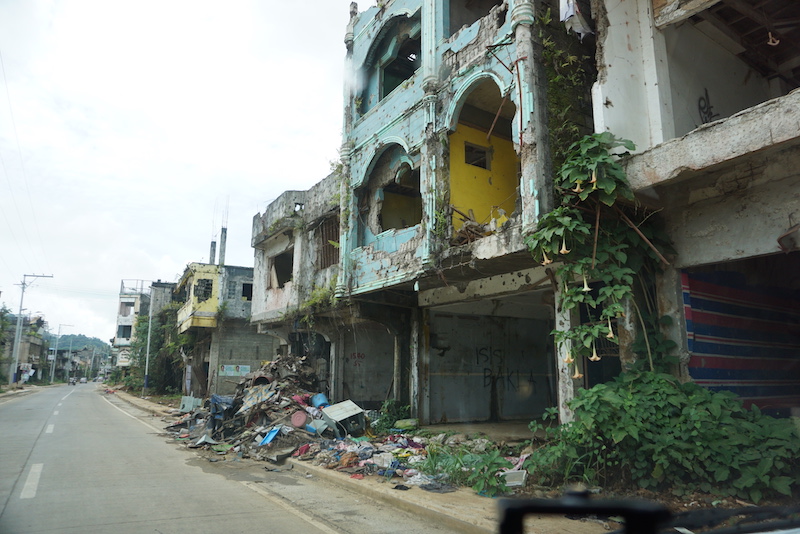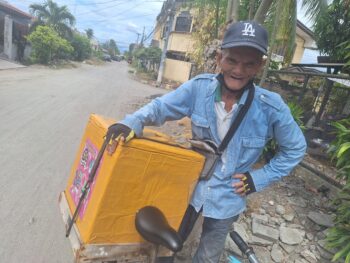DAVAO CITY (MindaNews / 09 October) — After a hundred days in office, President Ferdinand Marcos Jr., has yet to name the nine-member Marawi Compensation Board (MCB) which is tasked, among others, to receive, evaluate, process and investigate applications from displaced Marawi residents for compensation for loss of lives and properties due to the 2017 siege.
Republic Act 11696 or the Marawi Siege Victims Act of 2022, mandates the board to promulgate the Implementing Rules, Regulations (IRR), ensure the Post Conflict Needs Assessment (PCNA) is updated and there is a substantial budget in the 2023 General Appropriations Act to implement the law.
The IRR is supposed to be promulgated by the board in consultation with the Department of Finance, Department of Budget and Management, Bangsamoro Human Rights Commission, Task Force Bangon Marawi (TFBM) and the National Economic Development Authority, “within 60 days from the effectivity” of the law.
 Ruined buildings await the return of their owners in ‘Ground Zero,’ Marawi City on 1 April 2022. Many displaced residents are waiting for the monetary compensation so they could rebuild their homes and shops. MindaNews photo by GREGORIO C. BUENO
Ruined buildings await the return of their owners in ‘Ground Zero,’ Marawi City on 1 April 2022. Many displaced residents are waiting for the monetary compensation so they could rebuild their homes and shops. MindaNews photo by GREGORIO C. BUENO
RA 11696 was signed into law by then President Rodrigo Duterte on April 13 this year and published in the Official Gazette on April 27. Reckoned from publication date, it became effective on May 12. The IRR is supposed to have been promulgated “within 60 days” or on or before July 12, 2022.
As of October 9, the MCB has yet to be constituted.
Provincial efforts
On October 5, Lanao del Sur Governor Mamintal Adiong Jr. issued a memorandum order addressed to all heads of offices to attend a “Stakeholders’ Consultation on the Draft Marawi Compensation Law – Implementing Rules and Regulations” on Tuesday, October 11, at the provincial capitol’s Social Hall.
Adiong’s memo order noted that a group discussion on “Navigating through the Challenges and Implementation of the Marawi Compensation Law” was held on September 18 to 20 while a workshop on the law’s proposed IRR was conducted in Cagayan de Oro City on September 26 to 29 “to help fast-track the organization of the Marawi Compensation Board” and help the internally displaced residents of Marawi City claim and benefit from the law.
The October 11 stakeholders’ meeting is “in continuance with this undertaking and to affirm our commitment to generate greater momentum and establish a shared vision through a participative and consultative decision-making.”
Jennie Tamano, provincial information officer told MindaNews that the Provincial Legal Office of Lanao del Sur drafted the IRR even as the MCB has yet to be constituted to “help speed up the implementation dahil may ready draft na for them to consider.”
She quoted Atty Faisal Cali, Provincial Legal Officer, as saying that in preparing the draft IRR, “we are assured that the IRR reflects the sentiments and circumstances on the ground.”
Cali was also quoted as saying that drafting the IRR would also push the national government to fast-track the process.
Tax-free
The Marawi Siege Victims Compensation Act of 2022 provides tax-free monetary compensation to three kinds of claimants displaced by the Marawi Siege of 2017: those whose properties were destroyed; those who lost their loved ones during the five-month war between government forces and the Islamic State-inspired Maute Group; and those whose properties were demolished during the implementation of the MRRRP (Marawi Recovery, Rehabilitation and Reconstruction Program),
To be compensated are those who suffered total or partial destruction of their residential property; cultural property and facilities such as mosques, madaris, schools and colleges, hospitals and other health facilities; commercial property or those used exclusively for commercial or business purposes; and other properties such as “house appliances, jewelries, machineries, rice mills, and other equipment of value” in 32 of Marawi City’s 96 barangays that were devastated by the war.
The 32 barangays refer to the 24 barangays in the 250-hectare former main battle area or ‘Ground Zero’ during the five-month war, now referred to as Most Affected Area (MAA), and eight barangays that also suffered damages, or “Other Affected Areas” (OAA).
The amount of compensation will be determined by the MCB.
Claimants have up to one year from the organization of the MCB to file their claims. The Board has five years from the effectivity of the IRR to do its work.
Marawi Compensation Board
According to RA 1196, members of the independent and quasi-judicial Marawi Compensation Board must be of “known probity, competence and integrity” and must have a deep and thorough understanding and knowledge of compensation as a concept in international law and Philippine law.
At least three of them must be lawyers, preferably Meranaw who have been engaged in the practice of law for at least five years; two must be representatives of civil society organizations, one of whom is a Sharia lawyer or a Muslim traditional leader; one licensed physician, one accountant, one educator and one licensed civil engineer.
The Board is supposed to organize itself within 30 days from the completion of the appointment of its members, and organize its Secretariat.
The chair and eight other members of the MCB will be appointed by the President but organizations of traditional leaders, professionals, the ulama and civil society “may submit nominations to the President.”
The board is tasked to receive, evaluate, process and investigate applications for claims; issue subpoenas ad testificandum and subpoenas duces tecum; conduct independent administrative proceedings and resolve disputes over claims; approve with finality all eligible claims; disburse any and all compensation to qualified claimants at the earliest possible time; promulgate rules as may be necessary to carry out the purposes of the law; exercise administrative control and supervision over its Secretariat; at its discretion, may consult organizations of traditional leaders, professionals, ulama and civil society; and perform such other duties, functions, and responsibilities as may be necessary to effectively attain the objectives of the law.
On July 22, Senator Robinhood Padilla filed Resolution No. 8 urging the Office of the Executive Secretary to “conduct the vetting process of the nominees that will compose the Marawi Compensation Board for purposes of their appointment by the President.”
Post Conflict Needs Assessment
The law also provides that in the absence of baseline data or the required documents, the validated cost estimates and data utilized for the PCNA mandated under the MRRRP may be used to determine just compensation. It also provides that the Office of Civil Defense (OCD), in coordination with Task Force Bangon Marawi (TFBM ) shall update the PCNA report within three months after the effectivity of the law “for purposes of assessing the degree of damage and present the actual or estimated valuation of such damage to each structure caused by the siege and implementation of MRRRP.”
Updating the PCNA has been delayed. Three months from the effectivity of the law was August 12.
The law says that in updating the PCNA report, “the agencies shall also consider additional information on the damages and losses incurred from areas that have become accessible only after the mitigation of security threats.”
The PCNA under the MRRRP estimated the damages and losses at 18.6 billion pesos and noted that financing the full recovery and rehabilitation of Marawi and affected areas would need 51.7 billion pesos.
In March 2019, the Integrated Bar of the Philippines’ Lanao del Sur – Marawi City Chapter submitted to the House Sub-Committee on Marawi Rehabilitation documents pertaining to the claims of 15,102 residents displaced from Ground Zero of a total of 91.6 billion pesos in damages brought about by the five-month war between government forces and the Islamic State-inspired Maute Group and its allies in 2017. (Carolyn O. Arguillas / MindaNews)
